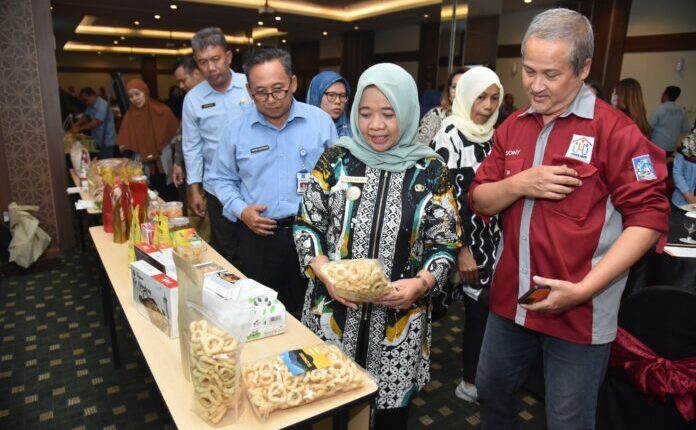Synergy with Private Entrepreneurs Accelerates MSME Growth
By: Andi Mahesa)*
Indonesia has great potential in the micro, small, and medium enterprises (MSMEs) sector. According to data from the Ministry of Cooperatives and SMEs, MSMEs contribute more than 60% to Indonesia’s Gross Domestic Product (GDP) and absorb more than 97% of the workforce. Although the contribution of MSMEs is very large, this sector still faces various challenges, including access to capital, technology, marketing, and management. Therefore, synergy or collaboration between the government and private entrepreneurs is the main key to accelerating the growth of MSMEs in Indonesia.
The government has a strategic role in creating policies that support the growth of MSMEs. Through MSME-friendly regulations, tax incentives, and easy access to capital, the government can open up wider opportunities for MSMEs to grow. For example, policies such as the People’s Business Credit (KUR) program that provides low-interest credit are significant steps in overcoming the capital difficulties often faced by MSME actors.
In addition, the government also plays a role in building adequate digital infrastructure. Along with the rapid development of the digital economy, many MSMEs are hampered in accessing online platforms due to limited knowledge and infrastructure. Therefore, collaboration with the private sector to provide digital training, build an integrated e-commerce system, and optimize internet networks in remote areas will provide great opportunities for MSMEs to develop in the digital market.
Collaboration between the government and private entrepreneurs in this case is very crucial. The government can facilitate cooperation between technology companies and MSMEs in the form of training programs, mentoring, and the provision of devices and applications that are easily accessible to MSME actors. For example, cooperation between the government and one of the e-commerce Tokopedia to empower MSMEs through their digital platform has proven successful in increasing the visibility and marketing of MSME products to a wider market. Tokopedia was founded by William Tanuwijaya and Leontinus Alpha Edison since August 17, 2009, with the same mission as the government, digital economic equality.
One of the parts of the digital ecosystem is the emergence of various e-commerce platforms in the country. Through e-commerce, MSMEs get support to market their products and services. This shows that MSMEs have adapted quite well in using digital platforms. MSMEs have utilized e-commerce platforms to reach a wider market.
Tokopedia’s MSMEs also felt three benefits from the synergy, namely 66 percent felt many promo programs that were beneficial for sellers. While 59 percent saw that the synergy could reach a wider market. From the synergy, 41 percent felt an increase in sales volume or income.
Coordinating Minister for Human Development and Culture (Menko PMK), Muhaimin Iskandar said that his party has appointed Leontinus Alpha Edison (Leon) to become Deputy for Community Economic Empowerment of Kemenko-PMK to strengthen the MSME sector. Leon has long experience in establishing Tokopedia, the majority of whose clients are MSMEs. With this experience, Leon is expected to be able to help overcome the economic problems of the community, especially in the MSME sector.
Leon’s involvement is also expected to provide new impetus in the economic empowerment program. The importance of economic empowerment as a primary strategy in improving community welfare. Later, the approach taken will not only be charitable, but also oriented towards economic independence.
In addition, the Ministry of SMEs has attempted to encourage the growth of SMEs by connecting business actors with various parties such as industry experts, strategic partners, and investors. Deputy for SMEs at the Ministry of SMEs, Temmy Satya Permana said that these efforts are a real form of the Ministry of SMEs to create a collaborative ecosystem that supports the growth of SMEs and the development of a sustainable local economy.
In this way, the collaboration is able to create new business opportunities and expand networks or obtain financing for the development of MSME businesses. He also emphasized the need for regulations that support cooperation between MSMEs and large companies. The regulation aims to identify potential benefits as well as risks that may arise, so that cooperation can run optimally.
In line with this, the Expert Staff of the Minister of SMEs for Inter-Institutional Relations of the Ministry of SMEs, Riza Damanik said that his party will encourage cooperation with both the private sector and BUMN to strengthen the UMKM ecosystem to be more inclusive and sustainable in order to realize the Sustainable Development Goals (SDGs).
Riza said one of the challenges for MSMEs to develop and move up a class is the ease of access to financing. Indonesia already has a number of financing schemes for MSMEs including KUR, PNM, fintech, and security crowdfunding. Therefore, collaboration needs to be continuously improved to provide easier and cheaper access to financing for MSMEs.
That way, when MSMEs feel they are benefiting from government policies, they will have a sense of security and trust in the existing economic system. This trust will encourage them to be more active in entrepreneurship and involve more people in economic activities. The social and economic stability created by this collaboration will have a positive long-term impact on Indonesia, making this country more resilient in facing global economic challenges in the future.
)* The author is a student who lives in Jakarta.
